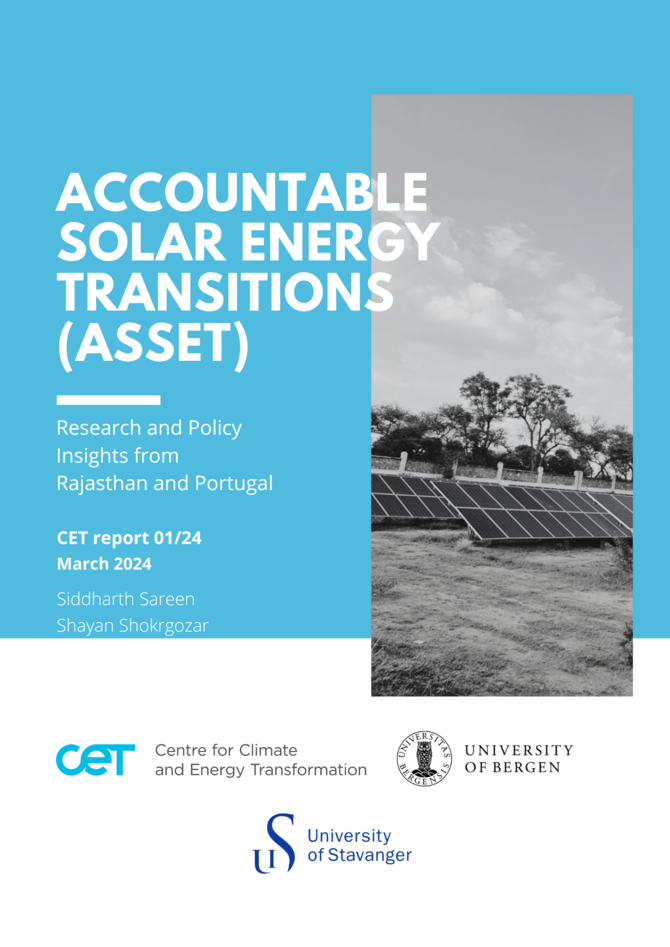ASSET
The project aims to produce insights that can support the just, accountable governance of multi-scalar energy transitions in financially constrained contexts.

Main content
The failure to rapidly cut emissions despite impending climate breakdown is undermining the legitimacy of the institutions that govern multi-scalar energy transitions. Accountability scholarship has focused on structural aspects of global and national governance, but neglected (i) informal contestation and power dynamics in sustainability transitions, and (ii) the sub-national scales where regional and local politics and priorities determine the political economy of low-carbon energy transitions.
Through timely adaptation of established insights to rapid transitions beyond structuralist approaches, the project seeks to establish accountability analysis as a major methodology. It asks: How do accountability relations affect rapid energy transition? It aims to produce insights that can support the just, accountable governance of multi-scalar energy transitions in financially constrained contexts. The project will advance research at the intersection of accountability and energy transitions, using the rapid case of solar energy rollout. It will apply an accountability analysis approach in a first-of-its-kind comparative multi-scalar design to study energy transitions governance. This will advance research on energy governance and inform policies for Accountable Solar Energy TransitionS (ASSET). It combines ethnographic methods with an explicitly comparative research design, and will integrate informal practices into future energy governance research.
Unlike most solar rollout studies that focus on first-mover states, ASSET will study financially constrained contexts: Portugal and Rajasthan. Another novel aspect is the choice of many multi-scalar solar rollout projects at quite diverse energy development levels, yet with sufficient similarities for analytical comparison. Thus, the project will produce actionable knowledge on policies for just and rapid solar energy rollout and theorise the relationship between accountable governance and the impact of energy transitions.
It will produce socio-spatial insights on solar rollouts that can support the accountable governance of multi-scalar energy transitions in financially constrained contexts at diverse energy development levels.
Objectives
Comparative insights on multi-scalar solar energy rollouts in financially constrained contexts.
Comparative insights on accountability relations in the governance of solar energy transitions.
Generate actionable knowledge for just solar energy rollout across energy development levels.
Work Packages
WP 1 Solar energy rollout
How is solar energy rollout at multiple spatial scales governed in distinct financially constrained contexts?
In this WP, my team will complete a desk review of formal institutional structures, relevant energy policies and stakeholder analysis for solar energy rollout in Portugal and Rajasthan, and an in-depth ethnographic study of the formal as well as informal practices through which solar energy rollout is governed in these financially constrained contexts
WP 2 Accountable governance of transitions
How do accountability relations condition the governance of solar energy rollout during regional energy transitions?
This WP is analytically oriented. Its theoretical foundation follows from the insight that energy governance is polycentric and relational rather than linear. This means accountor-accountee relations cannot be specified solely for formal institutional structures, but must acknowledge the informal practices studied in WP1.
WP 3 Justice effects of transitions
How can policies ensure that solar energy rollout has just impacts across diverse energy development levels?
This WP aims to translate analytical insights into actionable knowledge on the one hand, and theorise them on the other. It moves from the characterisation of accountability of the practices through which particular forms of solar energy rollout are legitimated to the identification of pathways for just and rapid transitions.
WP 4 Integration and dissemination of knowledge
Publications
Siddharth, S., Grandin, J. & Haarstad, H. (2022) Multiscalar Practices of Fossil Fuel Displacement. Annals of the American Association of Geographers, 112 (3), 808-818. https://doi.org/10.1080/24694452.2021.2000850
Siddharth, S. & Nordholm, A.J. (2021) Sustainable development goal interactions for a just transition: multi-scalar solar energy rollout in Portugal, Energy Sources. Part B: Economics, Planning, and Policy, 16 (11-12), 1048-1063. https://doi.org/10.1080/15567249.2021.1922547
Siddharth, S. & Wolf S.A. (2021) Accountability and sustainability transitions. Ecological Economics, 185. https://doi.org/10.1016/j.ecolecon.2021.107056
Sareen, S. (2022). Legitimating power: Solar energy rollout, sustainability metrics and transition politics. Environment and Planning E: Nature and Space, 5(3), 1014–1034. https://doi.org/10.1177/25148486211024903

